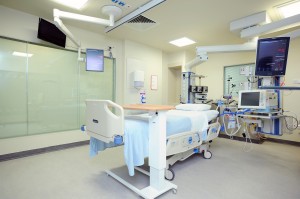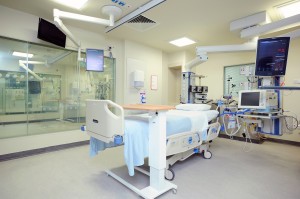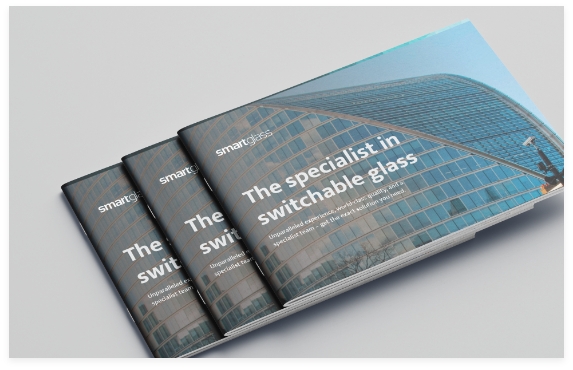Download Smartglass Brochure
spaces that adapt to users’ needs at the flick of a switch.
“Intelligent glass can provide healthcare facilities with better infection control and patient privacy at the flick of a switch”
The UK’s National Health Service is currently undergoing a large-scale refurbishment and new build programme to bring its aging infrastructure and facilities into the twenty first century. Nearly a fifth of the NHS estate was built before the health service was formed in 1948 and there are even wards in buildings that date back to the 1700s. As a result, 17% of the NHS estate that is occupied has been deemed as not functionally suitable for use.
The current modernisation programme undertaken by the NHS is allowing it to tackle several healthcare issues by using new products, smarter materials and better design. Modern, fit-for-purpose design is at the forefront of new NHS building and refurbishment, and it is helping to tackle issues such hospital acquired infections (HAIs).
The NHS has recently made it a key priority to reduce the levels of HAIs in its facilities. The risk of catching an HAI is relatively small, but it is thought that at any given time approximately 8% of hospital patients can have an HAI.
With medical technology continuously evolving and pushing the boundaries of greater understanding, some of our most basic healthcare practices have been somewhat neglected. Healthcare facilities can dramatically cut HAIs by modernising interiors and promoting fundamental cleaning practices.
It is estimated that controlling the levels of HAIs annually costs the NHS £1bn. To bring this figure down in the long term, it is more cost effective to focus investment on prevention rather than on treatment.
There are several policies that hospitals and healthcare facilities are pursuing to tackle HAIs. Lambeth Hospital recently set out four general principles for infection prevention and control:
In some cases, it is simply not enough to clean existing areas and materials more often or more thoroughly; sometimes the materials themselves need to be replaced with more effective contamination control substitutes. SmartGlass Medical is dedicated to improving hospital and healthcare cleanliness by reducing the spread of infection through intelligent partitioning.
Through continued studies it has been proven that sheer, easily cleaned surfaces are essential in hospitals to reduce the risks associated with the spread of super bugs such as Clostridium difficile (C.diff), Methicillin-resistant Staphylococcus aureus (MRSA) and Vancomycin-resistant Enterococcus (VRE). LC SmartGlass provides such a surface and helps in the replacement of traditional blind systems that are difficult to clean and constitute a high risk in terms of harbouring dirt and bugs.


LC SmartGlass uses a minute electrical current that can immediately switch the glass from clear to private (opaque) and vice versa. All LC SmartGlass panels are bespoke manufactured using a lamination process that encapsulates a polymer-dispersed liquid crystals (PDLC) film between two or more glass sheets.
The glass can be manufactured and supplied to suit varying healthcare requirements such as fire rated, x-ray proof and impact resistant. When the electrical supply is switched on, the liquid crystal molecules align allowing incident light to pass through, which instantly turns LC SmartGlass transparent.
Curtains spread bugs
A recent American study by the Cleveland Veterans Affairs Medical Center in Ohio, US, found that curtains that hang between patient beds in hospitals can become contaminated with drug-resistant bacteria and may be playing a role in the spread of these germs in hospitals.
The study showed that C. diff, MRSA and VRE can be found on hospital privacy curtains. More worrying, researchers found that these bugs transfer onto the hands of people who touch the contaminated curtains, suggesting that healthcare workers who operate these may be spreading bugs. The study found that 43% of privacy curtains were contaminated with VRE, 22% of them harboured MRSA and 4% tested positive for C. diff.
The findings, published in the Journal of Infection Control and Hospital Epidemiology, have put contamination and privacy control in the spotlight. At the same time, the healthcare industry is in the midst of substantial refurbishment projects that demand innovative design and products as hospitals continue to modernise.
The benefits of using LC SmartGlass to reduce the spread of infection have led to a growing number of UK NHS practices incorporating LC SmartGlass into their wards. These include St Mary’s Hospital, the Royal Sunderland Hospital, and the Windsor Knee Clinic.
St Mary’s Hospital in Paddington, London, is a general acute hospital that diagnoses and treats a range of adult and paediatric conditions. The hospital prides itself on delivering the best patient experience by continuously improving patient standards and facilities infrastructure. Facilities director, Keith Murray, was keen to introduce innovative interior solutions that would help eliminate the threat of in-house infection and provide a comfortable environment where patient privacy and dignity would be protected at all times.
Patient privacy
The project involved using a series of glazed partition screens to section off clinical treatment rooms from public areas so that the spread of infection could be significantly reduced.
SmartGlass Medical completed the design, manufacture and installation of 55 LC SmartGlass toughened panels and toughened door panels for the Royal Sunderland Hospital in October 2010. The Hospital specified that it wanted modern, minimalistic partitioning for high dependency, isolation, and general post-operation wards.
LC SmartGlass toughened panels and toughened door panels were specified for the walls and doorways of the cubicles respectively, serving multiple purposes. In addition to providing for a more hygienic and sterile environment for these specialised wards, the glass has created an enhanced level of patient privacy and dignity in which patients or staff can change the seclusion and visual surroundings at the flick of a switch.
SmartGlass Medical also installed 18 LC SmartGlass panels used for nine separate consultancy rooms in the Windsor Knee Clinic, Berkshire. These panels proved a good fit with the clinic’s specification of a sleek, modern and clean finish. Each consultancy room is positioned along a corridor within the clinic with lots of people traffic passing by. SmartGlass provided the best solution to make each room instantly private and eliminated the need for curtains.
Reduced contact
In all three cases, the use of LC SmartGlass has helped hospitals and healthcare facilities reduce the spread of infection through the provision of easily cleaned surfaces. In addition, staff and patients alike do not need to handle the glass as they would for curtains. Consequently, this reduces the contact between people and materials.
The cleaning of SmartGlass can be achieved far more cheaply, supporting regular cleaning regimes with much less time and effort compared with traditional partitioning. Dr Allison McGeer, head of infection control at Toronto’s Mount Sinai Hospital, highlighted some of the issues with privacy curtains.
Privacy curtains, she explained, are difficult to clean and it takes considerable time taking them down, washing them and putting them back up: “Changing bed linen – that’s easy. Changing privacy curtains, on the other hand, is a pain in the neck.”
Control of surroundings
SmartGlass partitioning also fits well with NHS directives to improve patient privacy and dignity by allowing patients to be in command of their surroundings. It provides for better soundproofing than curtains, giving patients enhanced control in resting and sleeping at their own behest. The material also lets in plenty of light, which can help provide for a more holistic recovery process.
LC SmartGlass can be used as wall panels, internal doors and windows, x-ray screens, room dividers or mobile isolation screens. It offers the patient dignity and privacy, allowing hospital staff to safely and efficiently review patient wellbeing, while crucially providing several key facets for reducing hospital acquired infections.

Wherever you are in the world one of our team will be in touch to advise on the best smart glass solution for your needs.